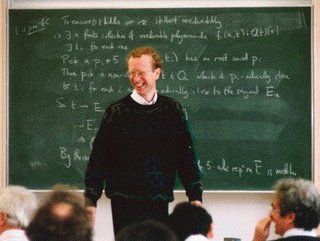
I just finished reading this book called "Fermat's Enigma" a couple of days ago. Authored by Simon Singh, the book tells the story of Fermat's last theorem and how it was finally proved. In case you do not already know (which might be unlikely), Fermat's last theorem states that the equation xn + yn = zn has no integer solutions for n > 2. It is a natural way to try and extend the Pythagoras' theorem but this has no solutions while the Pythagoras equation has an infinity of them. The theorem was stated by Pierre de Fermat in 1637 and proved by Andrew Wiles in 1994. The (famous) picture here shows Wiles announcing his proof at Cambridge.
The book itself is quite well written (one of the very few books I managed to almost finish in one sitting) and gives some interesting accounts of what went into the proof. It also tells stories about ancient Greek mathematics, few 17th and 18th century mathematicians and of course Andrew Wiles and his contemporaries. All this is intended for non-mathematical audience though. If you want to look at look at the mathematics Fermat's Last Theorem developed (i.e. the wrong proofs developed) read Paulo Ribenboim's "Fermat's Last Theorem for amateurs" or this link which also includes some ingredients of Wiles' proof.
It is interesting to realize the kind of gamble Wiles played. He set about proving the theorem in 1986 when it was realized that FLT would be implied by the Taniyama-Shimura conjecture (this was proved in Berkeley :-)). For the next seven years he worked in the attic of his home working with different techniques to prove the conjecture and announced a proof at Cambridge in 1993. It was later found to have a flaw which he corrected in 1994. Devoting a large part of his professional life to a single problem and working in secret all the time does require not only tenacity but also an amazing amount of self-confidence.
I wonder why although we say Indians are good mathematically, we hardly see examples of any great mathematics being done in India (ok - with the exception of the Primality testing algorithm). Is our education system geared towards a large number of "reasonably good" people rather than a few really good ones? Or are we afraid of the risks in focussing on one single thing and want to go for the low-hanging fruit? Ok.. enough of blabbering - go read the book!
The book itself is quite well written (one of the very few books I managed to almost finish in one sitting) and gives some interesting accounts of what went into the proof. It also tells stories about ancient Greek mathematics, few 17th and 18th century mathematicians and of course Andrew Wiles and his contemporaries. All this is intended for non-mathematical audience though. If you want to look at look at the mathematics Fermat's Last Theorem developed (i.e. the wrong proofs developed) read Paulo Ribenboim's "Fermat's Last Theorem for amateurs" or this link which also includes some ingredients of Wiles' proof.
It is interesting to realize the kind of gamble Wiles played. He set about proving the theorem in 1986 when it was realized that FLT would be implied by the Taniyama-Shimura conjecture (this was proved in Berkeley :-)). For the next seven years he worked in the attic of his home working with different techniques to prove the conjecture and announced a proof at Cambridge in 1993. It was later found to have a flaw which he corrected in 1994. Devoting a large part of his professional life to a single problem and working in secret all the time does require not only tenacity but also an amazing amount of self-confidence.
I wonder why although we say Indians are good mathematically, we hardly see examples of any great mathematics being done in India (ok - with the exception of the Primality testing algorithm). Is our education system geared towards a large number of "reasonably good" people rather than a few really good ones? Or are we afraid of the risks in focussing on one single thing and want to go for the low-hanging fruit? Ok.. enough of blabbering - go read the book!
2 comments:
Nice ending to the para.. didn't actually go through the who thing.. but the last few lines definitely caught my attention.
I dont know the reason for this, but I personally hold the opinion that our education system, in general and IITs in particular, are tailored to promote and hone "excellence in mediocrity" rather than "excellence" itself, even though the outcome may be "mediocre". The drive for perfection is always given a lower priority to the 80-20 rule (basically 'if it ain't broke, why fix it').
@sisyphus: Apologies for over-generalization! I probably got too carried away by the image obtained at the IITs. I saw these cartoons ages ago when you were still "publishing". The monster himself pointed me to your blog. Great ones I must say :)
Are you final on Yale then?
Post a Comment